Freemasonry and Rosicrucianism: Unravelling the Mysteries of Two Esoteric Traditions
The Origins of Freemasonry
Freemasonry is a centuries-old fraternal organization that traces its roots back to the medieval guilds of stonemasons. These skilled craftsmen were responsible for constructing many of the great cathedrals and buildings during the Middle Ages.
As time went by, the organization evolved from an operative fraternity, focusing on the craft of stonemasonry, into a speculative one, centered on the symbolic teachings and allegorical rituals.
The modern form of Freemasonry began in the early 18th century, with the establishment of the first Grand Lodge in London in 1717. This marked the beginning of a new era where the organization became focused on personal development, moral virtues, and brotherhood among its members.
Freemasons use allegorical symbols and ceremonies to convey their teachings. These symbols are derived from the tools and practices of stonemasons and are used as metaphors for ethical and moral guidance.
Some of the most well-known symbols in Freemasonry include the square and compasses, the trowel, and the level.
Understanding the Rosicrucian Tradition
Rosicrucianism emerged as a spiritual and philosophical movement during the early 17th century, when a series of mysterious texts known as the Rosicrucian manifestos were circulated throughout Europe.
These enigmatic documents told the story of a mythical figure named Christian Rosenkreuz, his travels to acquire wisdom, and the founding of the Fraternitas Rosae Crucis (the Brotherhood of the Rosy Cross).
The teachings of Rosicrucianism incorporate various elements of mysticism, alchemy, and esoteric philosophy. Central to its doctrine is the belief in spiritual transformation and inner alchemy, often symbolized by the image of the Rosy Cross.
This cross represents the unification of opposites, such as masculine and feminine energies, and it is seen as a tool for spiritual development and the pursuit of esoteric knowledge.

Christian Rosenkreuz
IMAGE LINKED: wikimedia Attribution 4.0 International (CC BY 4.0)
Christian Rosenkreuz: The Legendary Figure Behind Rosicrucianism
Christian Rosenkreuz is a legendary, mythical figure associated with the origins of Rosicrucianism.
The story of Christian Rosenkreuz not only forms the foundation of the Rosicrucian tradition but also serves as an allegorical narrative representing the journey of spiritual enlightenment and transformation.
Through examining Rosenkreuz’s life and the significance of his work, we can gain a deeper understanding of the key principles and teachings of Rosicrucianism.
The Life of Christian Rosenkreuz
Christian Rosenkreuz is said to be a German mystical, alchemical, and philosophical figure who lived during the late 14th and early 15th centuries.
The most well-known Rosicrucian manifesto, titled “Fama Fraternitatis” (The Fame of the Brotherhood), recounts the story of Rosenkreuz’s life and his quest for esoteric knowledge.
According to the legend, Rosenkreuz embarked on a journey to the East, where he encountered various secret societies and schools of wisdom.
During these travels, he acquired profound knowledge and understanding of the mystical arts, including alchemy, Kabbalah, and the Hermetic sciences.
Upon his return to Europe, Rosenkreuz established the Fraternitas Rosae Crucis (the Brotherhood of the Rosy Cross) to impart his teachings and promote spiritual and intellectual development.
The Rosicrucian manifestos, including the “Fama Fraternitatis” and “Confessio Fraternitatis” (The Confession of the Brotherhood), present Christian Rosenkreuz as a wise, enlightened figure who possessed secret knowledge of the divine mysteries, encompassing alchemy, medicine, and spirituality.
The manifestos propagated the ideals of the Rosicrucian Brotherhood, emphasizing the pursuit of wisdom, the healing arts, and the transformation of society through understanding the mysteries of the universe.
The Importance of Christian Rosenkreuz’s Work
The work of Christian Rosenkreuz has had a significant impact on the development of Western esotericism, mainly due to the ideas presented in the Rosicrucian manifestos.
He is credited with initiating core values and concepts that underlie the Rosicrucian tradition, including the following aspects:
Exploration of Esoteric Knowledge
Christian Rosenkreuz’s lifelong quest for esoteric wisdom serves as a model for those seeking to unveil the mysteries of the universe.
The legend advocates that one must embark on a spiritual journey of discovery, seeking knowledge from various sources, traditions, and teachings.
This highlights the interdisciplinary nature of Rosicrucianism, which combines mystical, alchemical, and philosophical elements from various cultures and traditions.
Spiritual Transformation and Inner Alchemy
Christian Rosenkreuz’s work emphasizes the importance of spiritual transformation and inner alchemy in achieving enlightenment and understanding the divine mysteries.
The process of spiritual awakening involves purifying oneself through the practice of virtues and the pursuit of esoteric knowledge.
This concept plays a central role in the Rosicrucian belief system and has influenced numerous other esoteric traditions that value self-improvement and spiritual growth.
The Rosicrucian Brotherhood and Intellectual Renewal
Founded by Christian Rosenkreuz, the Fraternitas Rosae Crucis serves as an invisible or secret brotherhood working towards the spiritual and intellectual transformation of society.
The Rosicrucian manifestos call for a renewal of the human spirit and broader understanding of the divine laws through the acquisition and dissemination of esoteric knowledge.
This vision has inspired many generations of seekers and has had a profound effect on various movements within Western esotericism.
Christian Rosenkreuz exemplifies the seeker’s path and highlights the fundamental principles of the Rosicrucian tradition.
Although considered a mythical figure, the influence of Rosenkreuz and his teachings has been pervasive throughout Western esotericism, shaping later movements and thinkers.
As an emblem of the Rosicrucian tradition, Christian Rosenkreuz serves as a timeless guide and inspiration for the pursuit of spiritual illumination, inner alchemy, and the understanding of the hidden mysteries of the universe.
The Connection Between Freemasonry and Rosicrucianism
While Freemasonry and Rosicrucianism may appear to have distinct origins and teachings, they have a certain degree of overlap and interconnectedness. This connection can be seen in several aspects:
Shared Symbols and Themes
Both Freemasonry and Rosicrucianism utilize symbols and allegory to convey their spiritual teachings. For example, the symbol of the square and compasses, often associated with Freemasonry, can also be connected to Rosicrucian ideas of balance and harmony between opposites.
Similarly, the Rose Cross, a symbol of the Rosicrucian tradition, has been incorporated into certain Masonic rituals and degrees.
Influence of the Rosicrucian Manifestos
The publication of the Rosicrucian manifestos in the early 17th century generated considerable intrigue among intellectuals, alchemists, and seekers of esoteric knowledge throughout Europe.
This interest carried over into the development of Freemasonry in the 18th century, with some Masonic writers and ritualists drawing upon Rosicrucian themes and imagery for inspiration.
The Higher Degrees of Freemasonry
Within the degree system of certain fraternities, a connection between Freemasonry and Rosicrucianism becomes even more evident.
One example is the Ancient and Accepted Scottish Rite, a Masonic organization dating back to the 18th century. Among its numerous degrees, the Scottish Rite includes the 18th degree, known as the Knight Rose Croix.
This degree has explicit references to Rosicrucian ideas and symbolism, demonstrating a clear connection between the two traditions.
Differentiating Between Freemasonry and Rosicrucianism
Although Freemasonry and Rosicrucianism have some overlapping elements and a shared interest in esoteric knowledge, they are two distinct organizations with separate histories, philosophies, and practices.
Membership, Organization, and Structure
Freemasonry and Rosicrucianism each have their unique membership, organizational structure, and hierarchical system.
While some individuals may be members of both organizations, this is not a requirement, and it is essential to understand each tradition as separate entities.
Distinct Histories and Philosophies
The origins of Freemasonry and Rosicrucianism differ significantly, as do their philosophical teachings.
Freemasonry focuses on moral and ethical development through rituals and symbolism stemming from stonemason guilds, while Rosicrucianism is rooted in the mystical, alchemical, and esoteric teachings found in the myth of Christian Rosenkreuz and the manifestos.
Analyzing the Impact of Freemasonry and Rosicrucianism on Western Esotericism
Both Freemasonry and Rosicrucianism have significantly influenced the development of Western esotericism, shaping the ideas and practices of numerous spiritual and philosophical movements.
The Enlightenment and the Age of Reason
During the Enlightenment, Freemasonry and Rosicrucianism played a crucial role in promoting rationalism, tolerance, and the search for a universal system of morality.
By fostering intellectual inquiry, they contributed to the development of a more open, egalitarian, and progressive society.
The Occult Revival
In the 19th century, Freemasonry and Rosicrucianism deeply impacted the Occult Revival, a period marked by the resurgence of interest in the esoteric, supernatural, and hidden aspects of human experience.
By disseminating and preserving esoteric knowledge, these traditions helped lay the foundation for later movements such as Theosophy, the Hermetic Order of the Golden Dawn, and various schools of spiritualism and magic.
Modern Esotericism and Spirituality
Freemasonry and Rosicrucianism continue to influence modern esotericism and spiritual practice. Today, both traditions have an extensive membership base and are active in promoting the pursuit of wisdom, moral development, and spiritual growth.
By fostering a sense of continuity and connectedness with ancient mysteries and teachings, Freemasonry and Rosicrucianism serve as essential links to the rich heritage of Western esoteric thought.
Conclusion
In conclusion, while Freemasonry and Rosicrucianism share some connections and similarities, they are two distinct and separate traditions with their unique histories, teachings, and organizational structures.
The connection between the two is primarily seen in shared symbols, the influence of the Rosicrucian manifestos on Freemasonry, and their incorporation into the higher degrees of certain Masonic systems.
However, it is vital to respect and understand the distinction between these two esoteric traditions and appreciate each for its contribution to the rich tapestry of Western spiritual and philosophical thought.
From the Enlightenment to the Occult Revival and modern spirituality, Freemasonry and Rosicrucianism have provided seekers of knowledge and wisdom with a treasure trove of esoteric teachings and valuable insights that continue to inspire and guide countless individuals in their quest for self-discovery and personal transformation.
Article by: Margaret S.

Margaret S. is a retired lecturer and devotes much of her time to theological and philosophical writing.
She was made a Freemason in the International Order of Freemasonry for Men and Women - Le Droit Humain.
(Margaret S. is her pen name for all her masonic papers)
Recent Articles: Esoteric Masonry
 Explore the multifaceted concept of the Divine across various cultural and religious perspectives. Delve into the intriguing deliberations on the Great Architect, Demiurge, and their roles in shaping our understanding of the cosmos, blending philosophical, theological, and metaphysical insights into a rich tapestry of human spirituality. |
 Unveiling the Mysteries: Explore the Enigmatic World of Rosicrucianism! Dive into the fascinating origins and teachings of the Rosicrucian tradition, shaped by the mythical figure Christian Rosenkreuz. Discover the secrets of alchemy, spiritual transformation, and esoteric knowledge. Unlock the hidden wisdom that has captivated seekers for centuries. Unleash your inner mystic today! |
 An Esoteric Interpretation of the Holy Royal Arch Delving into the profound mysteries of the Holy Royal Arch, Matt DA Fletcher offers an esoteric interpretation that challenges the conventional understanding of Freemasonry. While Craft Masonry is clear in its teachings, the Royal Arch remains an enigma for many. Fletcher's exploration uncovers the symbolic and philosophical depths of this degree, revealing its significance in the Mason's journey towards reintegration with the Creator. |
 Stoicism, Freemasonry, and the Modern Man Discover how the ancient wisdom of Stoicism can enrich Freemasonry and modern life. Dr. Chacón-Lozsán Francisco M.˙.M.˙. explores Stoic principles like virtue, resilience, and inner peace, offering practical insights for today's challenges. Learn how these timeless teachings can foster personal growth, ethical conduct, and emotional stability. |
 Explore the evolution of Masonic rites with the Universal Rite, a modern adaptation of the Ancient and Accepted Scottish Rite. Discover how it integrates contemporary principles, promotes intercultural dialogue, and ensures the timeless values of Freemasonry remain relevant in today's world. |
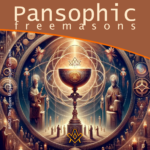 Unveil the secrets of Pansophic Freemasonry, a transformative journey through the ancient mystical traditions. Delve into the sacred realms of Rosicrucianism, Templar wisdom, Kabbalah, Gnosticism, and more. Discover the Graal, the sacred Grail that connects all esoteric paths. Embrace a holistic spiritual quest that reveals the profound mysteries of self and the universe. |
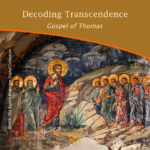 Dive into a spiritual journey where self-awareness is the key to enlightenment. The Gospel of Thomas and Masonic teachings converge on the profound truth that the path to transcendent wisdom lies within us. Embrace a diversified understanding of spirituality, emphasizing introspection as the gateway to a universally respected enlightenment. Explore, understand, transcend. |
 Philosophy the Science of Estimating Values Philosophy is the science of estimating values. The superiority of any state or substance over another is determined by philosophy. By assigning a position of primary importance to what remains when all that is secondary has been removed, philosophy thus becomes the true index of priority or emphasis in the realm of speculative thought. The mission of philosophy a priori is to establish the relation of manifested things to their invisible ultimate cause or nature. |
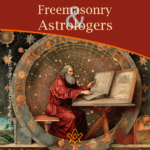 Unlocking the Mysteries: The Surprising Connection Between Freemasonry and Astrologers Revealed! Delve into the intriguing world of Freemasonry and explore its ties to astrological practices. Discover how these two distinct realms intersect, offering a fascinating glimpse into the esoteric interests of some Freemasons. Uncover the hidden links and unravel the enigmatic bond between Freemasonry and astrologers! |
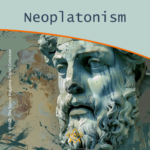 Neoplatonism, a philosophy with profound influence from the 3rd to the 6th century, merges Platonic ideals with Eastern thought, shaping Western and Middle-Eastern philosophy for two millennia. It emphasizes the unity of the individual with the supreme 'One', blending philosophy with theology and impacting major religious and philosophical movements, including Christianity and Islam. |
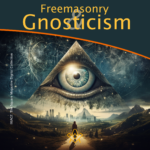 The enigmatic allure of Freemasonry's ancient rituals and Gnosticism's search for hidden knowledge capture the human spirit's endless quest for enlightenment. Between the stonemason's square and the Gnostic's divine spark lies a tantalizing intersection of philosophy, spirituality, and the pursuit of esoteric wisdom. Both traditions beckon with the promise of deeper understanding and moral elevation, inviting those who are drawn to unravel the tapestries of symbols and allegories. Whether through the fellowship of the lodge or the introspective journey of the soul, the paths of Freemasonry and Gnosticism represent a yearning to connect with something greater than ourselves—an impulse as old as time and as compelling as the mysteries they guard. |
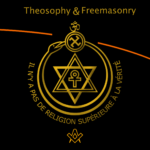 Embark on a journey through time and spirituality with our in-depth exploration of the Theosophical Society's Seal. This ancient emblem, rich with symbols, bridges humanity with the cosmos, echoing through the world's great faiths and diverse cultures. Our paper delves into the six mystical symbols, untangling their profound meanings and tracing their presence in historic art worldwide. Unaffiliated with worldly movements, these symbols open a window to esoteric wisdom. We also probe potential parallels with Freemasonry, seeking threads that might connect these storied organizations. Join us in unveiling the universal language of the spirit encoded within this enigmatic Seal. |
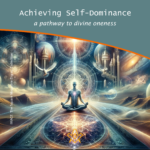 Discover the pathway to divine oneness through the concept of self-dominance. This thought-provoking essay explores the profound connection between self-control, spiritual growth, and achieving unity with the divine essence. With an interdisciplinary approach, it offers practical steps towards expanding consciousness and deepening our understanding of the divine. |
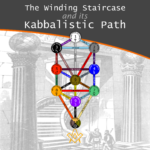 The Winding Staircase and its Kabbalistic Path The Winding Staircase in freemasonry is a renowned symbol of enlightenment. In this article, we explore its connection to Kabbalistic thought and how it mirrors the inner growth of a candidate as he progresses throughout his Masonic journey. From faith and discipline in Binah, to strength and discernment in Geburah, and finally to victory and emotional intuition in Netzach, each step represents a crucial aspect of personal development. Join us as we delve into the esoteric meanings of this powerful symbol. |
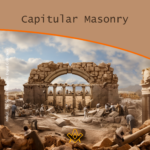 Unravel the mystic origins of Capitular Masonry, a secretive Freemasonry branch. Explore its evolution, symbolic degrees, and the Royal Arch's mysteries. Discover the Keystone's significance in this enlightening journey through Masonic wisdom, culminating in the ethereal Holy Royal Arch. |
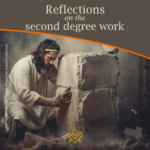 Reflections on the Second Degree Work Bro. Draško Miletić offers his reflections on his Second Degree Work – using metaphor, allegory and symbolism to understand the challenges we face as a Fellow Craft Mason to perfect the rough ashlar. |
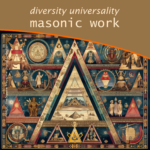 Diversity and Universality of Masonic Work Explore the rich tapestry of Masonic work, a testament to diversity and universality. Uncover its evolution through the 18th century, from the stabilization of Symbolic Freemasonry to the advent of Scottish rite and the birth of Great Continental Rites. Dive into this fascinating journey of Masonic systems, a unique blend of tradition and innovation. Antonio Jorge explores the diversity and universality of Masonic Work |
 Nonsense as a Factor in Soul Growth Although written 100 years ago, this article on retaining humour as a means of self-development and soul growth is as pertinent today as it was then! Let us remember the words of an ancient philosopher who said, when referring to the court jester of a king, “It takes the brightest man in all the land to make the greatest fool.” |
 Freemasonry: The Robe of Blue and Gold Three Fates weave this living garment and man himself is the creator of his fates. The triple thread of thought, action, and desire binds him when he enters into the sacred place or seeks admittance to the Lodge, but later this same cord is woven into the wedding garment whose purified folds shroud the sacred spark of his being. - Manly P Hall |
 By such a prudent and well regulated course of discipline as may best conduce to the preservation of your corporal and metal faculties in the fullest energy, thereby enabling you to exercise those talents wherewith god has blessed you to his glory and the welfare of your fellow creatures. |
 Jacob Ernst's 1870 treatise on the Philosophy of Freemasonry - The theory of Freemasonry is based upon the practice of virtuous principles, inculcating the highest standard of moral excellence. |
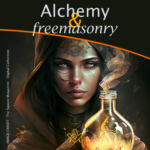 Alchemy, like Freemasonry, has two aspects, material and spiritual; the lower aspect being looked upon by initiates as symbolic of the higher. “Gold” is used as a symbol of perfection and the earlier traces of Alchemy are philosophical. A Lecture read before the Albert Edward Rose Croix Chapter No. 87 in 1949. by Ill. Bro. S. H. Perry 32° |
 The spirit of the Renaissance is long gone and today's globalized and hesitant man, no matter ideology and confession, is the one that is deprived of resoluteness, of decision making, the one whose opinion doesn't matter. Article by Draško Miletić, |
 A Mason's Work in the First Degree Every Mason's experiences are unique - here writer and artist Draško Miletić shares insights from his First Degree Work. |
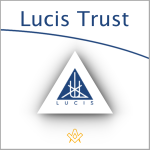 Initiation and the Lucis Trust The approach of the Lucis Trust to initiation may differ slightly to other Western Esoteric systems and Freemasonry, but the foundation of training for the neophyte to build good moral character and act in useful service to humanity is universal. |
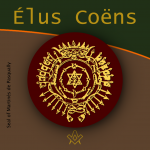 Who were the mysterious 18th century Élus Coëns – a.k.a The Order of Knight-Masons Elect Priests of the Universe – and why did they influence so many other esoteric and para-Masonic Orders? |
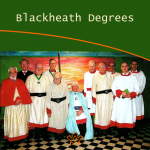 Bro. Chris Hatton gives us his personal reflections on the history of the 'house at Blackheath and the Blackheath Orders', in this wonderful tribute to Andrew Stephenson, a remarkable man and Mason. |
 Book Review - Cagliostro the Unknown Master The book review of the Cagliostro the Unknown Master, by the Editor of the book |
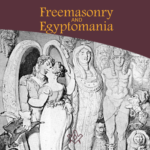 We explore fascinating and somewhat contentious historical interpretations that Freemasonry originated in ancient Egypt. |
 Is Freemasonry esoteric? Yes, no, maybe! |
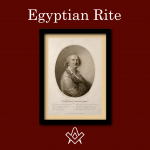 Egyptian Freemasonry, founder Cagliostro was famed throughout eighteenth century Europe for his reputation as a healer and alchemist |
masonic knowledge
to be a better citizen of the world
share the square with two brothers

click image to open email app on mobile device






